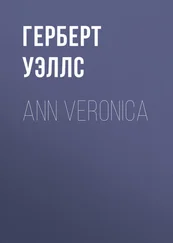brushed back and the spectacled Scotchman joined in the fray for
and against the women's vote.
Ever and again Capes appealed to Ann Veronica. He liked to draw
her in, and she did her best to talk. But she did not talk
readily, and in order to say something she plunged a little, and
felt she plunged. Capes scored back with an uncompromising vigor
that was his way of complimenting her intelligence. But this
afternoon it discovered an unusual vein of irritability in her.
He had been reading Belfort Bax, and declared himself a convert.
He contrasted the lot of women in general with the lot of men,
presented men as patient, self-immolating martyrs, and women as
the pampered favorites of Nature. A vein of conviction mingled
with his burlesque.
For a time he and Miss Klegg contradicted one another.
The question ceased to be a tea-table talk, and became suddenly
tragically real for Ann Veronica. There he sat, cheerfully
friendly in his sex's freedom--the man she loved, the one man she
cared should unlock the way to the wide world for her imprisoned
feminine possibilities, and he seemed regardless that she stifled
under his eyes; he made a jest of all this passionate insurgence
of the souls of women against the fate of their conditions.
Miss Garvice repeated again, and almost in the same words she
used at every discussion, her contribution to the great question.
She thought that women were not made for the struggle and turmoil
of life--their place was the little world, the home; that their
power lay not in votes but in influence over men and in making
the minds of their children fine and splendid.
"Women should understand men's affairs, perhaps," said Miss
Garvice, "but to mingle in them is just to sacrifice that power
of influencing they can exercise now."
"There IS something sound in that position," said Capes,
intervening as if to defend Miss Garvice against a possible
attack from Ann Veronica. "It may not be just and so forth, but,
after all, it is how things are. Women are not in the world in
the same sense that men are--fighting individuals in a scramble.
I don't see how they can be. Every home is a little recess, a
niche, out of the world of business and competition, in which
women and the future shelter."
"A little pit!" said Ann Veronica; "a little prison!"
"It's just as often a little refuge. Anyhow, that is how things
are."
"And the man stands as the master at the mouth of the den."
"As sentinel. You forget all the mass of training and tradition
and instinct that go to make him a tolerable master. Nature is a
mother; her sympathies have always been feminist, and she has
tempered the man to the shorn woman."
"I wish," said Ann Veronica, with sudden anger, "that you could
know what it is to live in a pit!"
She stood up as she spoke, and put down her cup beside Miss
Garvice's. She addressed Capes as though she spoke to him alone.
"I can't endure it," she said.
Every one turned to her in astonishment.
She felt she had to go on. "No man can realize," she said, "what
that pit can be. The way--the way we are led on! We are taught
to believe we are free in the world, to think we are queens. . .
. Then we find out. We find out no man will treat a woman fairly
as man to man--no man. He wants you--or he doesn't; and then he
helps some other woman against you. . . . What you say is
probably all true and necessary. . . . But think of the
disillusionment! Except for our sex we have minds like men,
desires like men. We come out into the world, some of us--"
She paused. Her words, as she said them, seemed to her to mean
nothing, and there was so much that struggled for expression.
"Women are mocked," she said. "Whenever they try to take hold of
life a man intervenes."
She felt, with a sudden horror, that she might weep. She wished
she had not stood up. She wondered wildly why she had stood up.
No one spoke, and she was impelled to flounder on. "Think of the
mockery!" she said. "Think how dumb we find ourselves and
stifled! I know we seem to have a sort of freedom. . . . Have
you ever tried to run and jump in petticoats, Mr. Capes? Well,
think what it must be to live in them--soul and mind and body!
It's fun for a man to jest at our position."
"I wasn't jesting," said Capes, abruptly.
She stood face to face with him, and his voice cut across her
speech and made her stop abruptly. She was sore and overstrung,
and it was intolerable to her that he should stand within three
yards of her unsuspectingly, with an incalculably vast power over
her happiness. She was sore with the perplexities of her
preposterous position. She was sick of herself, of her life, of
everything but him; and for him all her masked and hidden being
was crying out.
She stopped abruptly at the sound of his voice, and lost the
thread of what she was saying. In the pause she realized the
attention of the others converged upon her, and that the tears
were brimming over her eyes. She felt a storm of emotion surging
up within her. She became aware of the Scotch student regarding
her with stupendous amazement, a tea-cup poised in one hairy hand
and his faceted glasses showing a various enlargement of segments
of his eye.
The door into the passage offered itself with an irresistible
invitation--the one alternative to a public, inexplicable passion
of weeping.
Capes flashed to an understanding of her intention, sprang to his
feet, and opened the door for her retreat.
Part 8
"Why should I ever come back?" she said to herself, as she went
down the staircase.
She went to the post-office and drew out and sent off her money
to Ramage. And then she came out into the street, sure only of
one thing--that she could not return directly to her lodgings.
She wanted air--and the distraction of having moving and changing
things about her. The evenings were beginning to draw out, and
it would not be dark for an hour. She resolved to walk across
the Park to the Zoological gardens, and so on by way of Primrose
Hill to Hampstead Heath. There she would wander about in the
kindly darkness. And think things out. . . .
Presently she became aware of footsteps hurrying after her, and
glanced back to find Miss Klegg, a little out of breath, in
pursuit.
Ann Veronica halted a pace, and Miss Klegg came alongside.
"Do YOU go across the Park?"
"Not usually. But I'm going to-day. I want a walk."
"I'm not surprised at it. I thought Mr. Capes most trying."
"Oh, it wasn't that. I've had a headache all day."
"I thought Mr. Capes most unfair," Miss Klegg went on in a small,
even voice; "MOST unfair! I'm glad you spoke out as you did."
"I didn't mind that little argument."
"You gave it him well. What you said wanted saying. After you
went he got up and took refuge in the preparation-room. Or else
_I_ would have finished him."
Ann Veronica said nothing, and Miss Klegg went on: "He very often
IS--most unfair. He has a way of sitting on people. He wouldn't
like it if people did it to him. He jumps the words out of your
mouth; he takes hold of what you have to say before you have had
time to express it properly."
Pause.
"I suppose he's frightfully clever," said Miss Klegg.
"He's a Fellow of the Royal Society, and he can't be much over
thirty," said Miss Klegg.
"He writes very well," said Ann Veronica.
Читать дальше












